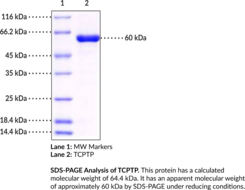Territorial Availability: Available through Bertin Technologies only in France
- Product Overview:
T cell protein tyrosine phosphatase (TCPTP) is a tyrosine phosphatase encoded by PTPN2 in humans.{52553} Two splice variants of TCPTP are expressed that contain identical N-termini and catalytic domains but varied C-termini: a 48 kDa form that contains a hydrophobic motif and is targeted to the endoplasmic reticulum and a 45 kDa form that is targeted to the nucleus by a bipartite nuclear localization sequence.{52553,52552} TCPTP is expressed at high levels in cells of hematopoietic origin but is also ubiquitously expressed in all tissues and cell types.{52553} Although the 45 kDa variant of TCPTP is nuclear localized in resting cells, it exits the nucleus in response to various cellular stimuli to dephosphorylate substrates in the cytoplasm and plasma membrane, including PDGFR, c-Met, Src, JAK1, and STAT1, to regulate cell signaling. Knockdown of Ptpn2 induces growth retardation, anemia, increased levels of circulating proinflammatory cytokines, diarrhea, and death in mice by 3 to 5 weeks of age. Protein levels of TCPTP are reduced in BT-483, MDA-MB-134, MDA-MB-157, and MDA-MB-175 breast cancer cells and overexpression of PTPN2 suppresses cell growth in MDA-MB-175 and BT-483 cells.{52552} PTPN2 SNPs have been linked to the development of type I diabetes, rheumatoid arthritis, and Crohn’s disease.{52554} Cayman’s TCPTP (human, recombinant; aa 1-314) protein can be used for enzyme activity applications. This protein consists of 551 amino acids and has a calculated molecular weight of 64.4 kDa. By SDS-PAGE, under reducing conditions, the apparent molecular mass of the protein is 60 kDa.
Cayman Chemical’s mission is to help make research possible by supplying scientists worldwide with the basic research tools necessary for advancing human and animal health. Our utmost commitment to healthcare researchers is to offer the highest quality products with an affordable pricing policy.
Our scientists are experts in the synthesis, purification, and characterization of biochemicals ranging from small drug-like heterocycles to complex biolipids, fatty acids, and many others. We are also highly skilled in all aspects of assay and antibody development, protein expression, crystallization, and structure determination.
Over the past thirty years, Cayman developed a deep knowledge base in lipid biochemistry, including research involving the arachidonic acid cascade, inositol phosphates, and cannabinoids. This knowledge enabled the production of reagents of exceptional quality for cancer, oxidative injury, epigenetics, neuroscience, inflammation, metabolism, and many additional lines of research.
Our organic and analytical chemists specialize in the rapid development of manufacturing processes and analytical methods to carry out clinical and commercial GMP-API production. Pre-clinical drug discovery efforts are currently underway in the areas of bone restoration and repair, muscular dystrophy, oncology, and inflammation. A separate group of Ph.D.-level scientists are dedicated to offering Hit-to-Lead Discovery and Profiling Services for epigenetic targets. Our knowledgeable chemists can be contracted to perform complete sample analysis for analytes measured by the majority of our assays. We also offer a wide range of analytical services using LC-MS/MS, HPLC, GC, and many other techniques.
Accreditations
ISO/IEC 17025:2005
ISO Guide 34:2009
Cayman is a leader in the field of emerging drugs of abuse, providing high-purity Schedule I-V Controlled Substances to federally-licensed laboratories and qualified academic research institutions for forensic analyses. We are certified by ACLASS Accreditation Services with dual accreditation to ISO/IEC 17025:2005 and ISO Guide 34:2009.





